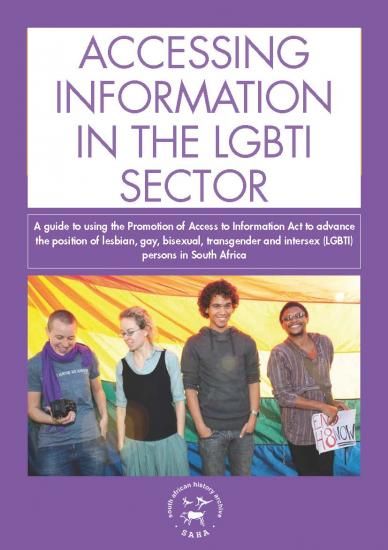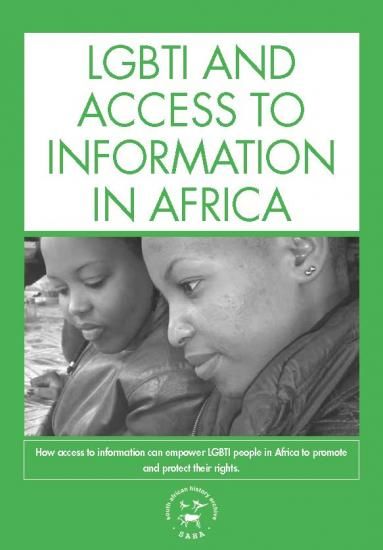LGBTI Sector
Accessing Information in the LGBTI Sector
This guide is designed to assist persons in the lesbian, gay, bisexual, transgender and intersex (LGBTI) sector to recognise the important role that access to information can play in the achievement of their advocacy goals.

South Africa's constitution expressly prohibits discrimination on the basis of sexual orientation, sex or gender and numerous laws have been enacted to protect the rights of LGBTI people. However, legal protections have not filtered down to the level of everyday life. The vast majority of LGBTI people in South Africa are still shut off from accessing their rights because of deep economic inequality, social isolation and cultural exclusion.
Access to information can be used to bridge the gap between the theoretical legal position and the everyday reality for LGBTI persons and inform evidence-based advocacy campaigns for change. In this way, the Promotion of Access to Information Act (PAIA) can be a vital tool for the LGBTI sector by providing a unique mechanism for gathering evidence that can inform substantive demands for change. PAIA can also be used to assist individuals in the LGBTI community to obtain information necessary to access their individual rights.
This guide provides examples of how PAIA can be used to address issues facing the LGBTI sector, outlines the responsibilities of key public bodies in terms of these issues and provides contact details for making PAIA requests to those bodies. The guide also provides the LGBTI sector with assistance in making requests to private bodies by providing practical examples of rights that LGBTI persons may be exercising in requesting records. The most commonly claimed grounds for refusing information are explained and possible grounds for appealing such refusals are discussed. Case studies demonstrating the use of PAIA to benefit the LGBTI sector are also provided.
Download Accessing Information in the LGBTI Sector
This guide was made possible through the generous support of the Open Society Foundation for South Africa and Atlantic Philanthropies.
LGBTI and Access to Information in Africa
This guide is designed to assist persons in the lesbian, gay, bisexual, transgender and intersex (LGBTI) sector in Africa to recognise the important role that access to information can play in the achievement of their advocacy goals and the protection of their human rights.

In many African countries same-sex relationships are illegal. Lesbian, gay and bisexual people are treated as criminals. Even in countries where the laws do not prohibit same-sex relationships, many lesbian, gay and bisexual people are victimised. The concept of same-sex conduct as ‘un-African' is dominant and repressive. Transgender and intersex people are also victimised and gender identity or being intersex is often misunderstood as being related to sexual orientation.
The vast majority of LGBTI people are shut off from accessing their rights because of social isolation and cultural exclusion. This is compounded by the fact that African society is dominated by heterosexist and homo-prejudice sources of information and representation.
This booklet outlines how LGBTI people can use access to information to push for the recognition of their rights and inform evidence-based advocacy campaigns to bring about change. It outlines the importance of the right to information and the legal basis for the right in Africa. It provides examples of how the right to information can be used to address issues facing the LGBTI sector and uses a case study to demonstrate how access to information has been used to assist a transgender employee to exercise her rights.
Download LGBTI and Access to Information in Africa
This guide was made possible through the generous support of the Open Society Foundation for South Africa and Atlantic Philanthropies.
{embed="" entry_id=""}
